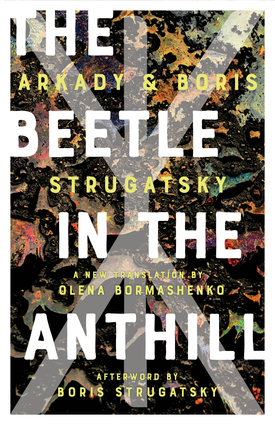
translated by Olena Bormashenko
original publication (in Russian): 1979
first English edition: 1980, Macmillan
this edition: 2023, Chicago Review Press
grab a copy here or through your local independent bookstore or library
“Any self-respecting detective story should, of course, have carefully and explicitly broken these questions down for the reader and provided a complete explanation of each one. But we weren’t in fact writing a detective story. We were writing a tragic tale about the fact that even in a kind, and gentle, and just world, the emergence of a secret police force (of any type, form, or style) will inevitably lead to innocent people suffering and dying, no matter how noble the goals of this secret force, and no matter how honest, decent, and noble the people staffing it may be.” – Boris Strugatsky “Afterword” (226)
The Beetle in the Anthill begins with a mystery: why has Progressor Lev Abalkin suddenly left his work on another planet and come to Earth? Moreover, why has he refused to check in with his bosses at COMCON-2 but is instead running around the planet contacting his old acquaintances and teachers and asking them strange questions about his past?
Beautifully translated by Olena Bormashenko and narrated by former space explorer/progressor and current COMCON-2 investigator Maxim Kammerer, Beetle is a series of nested mysteries about who Lev Abalkin really is, why he is avoiding the people tasked with protecting Earth from outside threats, and what actually happened to the people on the planet that Abalkin and his alien translator visited.
Tasked with tracking down Abalkin, Kammerer contacts his former girlfriend, physician, and teacher, all of whom are bewildered by Abalkin’s questions about who he actually is. Kammerer himself is kept in the dark by his boss about why Abalkin is so important, and thus Kammerer’s investigation stalls. Meanwhile, Kammerer includes bits and pieces of Abalkin’s notes about his time on a mysterious planet where almost the entire population has disappeared after the outbreak of a strange virus. For a while, the reader is led to believe that whatever Abalkin discovered about this planet is the reason for his strange behavior.
But then, that part of the story is never picked up again. Instead, we learn that Abalkin is actually one of thirteen humans born from eggs that were discovered on another planet many years before. With them are objects that are assumed to be some kind of detonators. Assuming that these embryos are somehow connected to the Wanderer civilization, the leaders at COMCON had decided to scatter the children born from the eggs across the world and then make sure that they were all stationed on other planets, just in case the Wanderers programmed them to threaten the Earth. Above all, these children are never to be told what they are.
Kammerer eventually learns from his boss that Abalkin has found out about his origins and is likely questioning people about his past in order to assure himself that he isn’t some sort of Wanderer android. The fact that he is trying to get access to the detonators, though, makes Kammerer’s boss wonder about Abalkin’s plans.
Like Roadside Picnic, The Dead Mountaineer’s Inn, The Inhabited Island, The Waves Extinguish the Wind, and so many other Strugatsky novels, Beetle is a science fiction detective story (despite Boris Strugatsky’s earlier quote). A mystery lies at the heart of each novel, one that isn’t neatly explained at any point in the book. In this way, the Strugatsky brothers are able to argue that their fiction, like life, isn’t straightforward and understandable. Things happen that can’t be explained or that can’t be connected to other events. Humans must try to make sense of their world and experiences based on what reasoning they have. Misunderstandings, secrets, lies, and misguided efforts may throw people off, but reason and instinct will (sometimes) help put them back on course.
Beetle demonstrates, among other things, how Maxim Kammerer develops as an explorer and then as an investigator. His broad view of human efforts to understand the Wanderers gives us a fascinating window onto the world of the Noon universe and the Strugatskys’ oeuvre.
